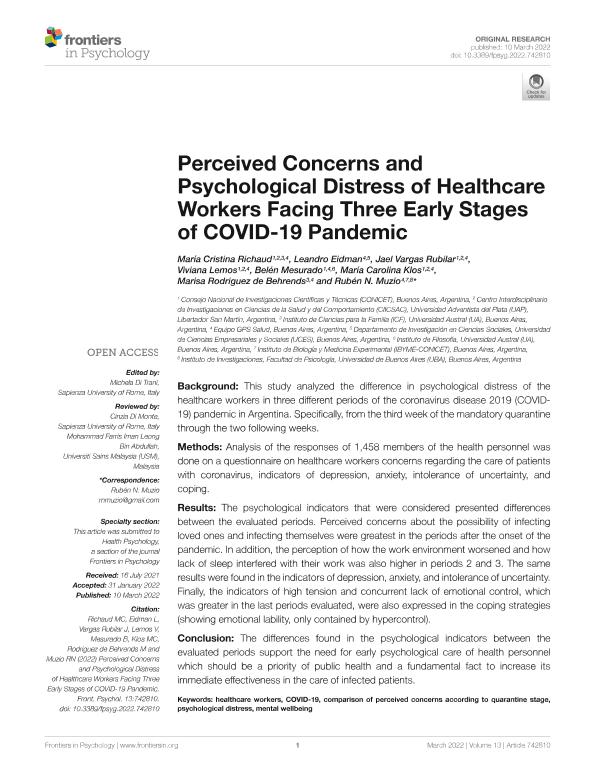Mostrar el registro sencillo del ítem
dc.contributor.author
Richaud, Maria Cristina

dc.contributor.author
Eidman, Leandro

dc.contributor.author
Vargas Rubilar, Jael Alejandra

dc.contributor.author
Lemos, Viviana Noemí

dc.contributor.author
Mesurado, Maria Belen

dc.contributor.author
Klos, María Carolina

dc.contributor.author
Rodriguez de Behrends, Marisa Verónica

dc.contributor.author
Muzio, Ruben Nestor

dc.date.available
2024-01-16T12:52:15Z
dc.date.issued
2022-03
dc.identifier.citation
Richaud, Maria Cristina; Eidman, Leandro; Vargas Rubilar, Jael Alejandra; Lemos, Viviana Noemí; Mesurado, Maria Belen; et al.; Perceived Concerns and Psychological Distress of Healthcare Workers Facing Three Early Stages of COVID-19 Pandemic; Frontiers Media; Frontiers in Psychology; 13; 3-2022; 1-14
dc.identifier.issn
1664-1078
dc.identifier.uri
http://hdl.handle.net/11336/223733
dc.description.abstract
Background: This study analyzed the difference in psychological distress of the healthcare workers in three different periods of the coronavirus disease 2019 (COVID-19) pandemic in Argentina. Specifically, from the third week of the mandatory quarantine through the two following weeks. Methods: Analysis of the responses of 1,458 members of the health personnel was done on a questionnaire on healthcare workers concerns regarding the care of patients with coronavirus, indicators of depression, anxiety, intolerance of uncertainty, and coping. Results: The psychological indicators that were considered presented differences between the evaluated periods. Perceived concerns about the possibility of infecting loved ones and infecting themselves were greatest in the periods after the onset of the pandemic. In addition, the perception of how the work environment worsened and how lack of sleep interfered with their work was also higher in periods 2 and 3. The same results were found in the indicators of depression, anxiety, and intolerance of uncertainty. Finally, the indicators of high tension and concurrent lack of emotional control, which was greater in the last periods evaluated, were also expressed in the coping strategies (showing emotional lability, only contained by hypercontrol). Conclusion: The differences found in the psychological indicators between the evaluated periods support the need for early psychological care of health personnel which should be a priority of public health and a fundamental fact to increase its immediate effectiveness in the care of infected patients.
dc.format
application/pdf
dc.language.iso
eng
dc.publisher
Frontiers Media

dc.rights
info:eu-repo/semantics/openAccess
dc.rights.uri
https://creativecommons.org/licenses/by-nc-sa/2.5/ar/
dc.subject
COMPARISON OF PERCEIVED CONCERNS ACCORDING TO QUARANTINE STAGE
dc.subject
COVID-19
dc.subject
HEALTHCARE WORKERS
dc.subject
MENTAL WELLBEING
dc.subject
PSYCHOLOGICAL DISTRESS
dc.subject.classification
Otras Psicología

dc.subject.classification
Psicología

dc.subject.classification
CIENCIAS SOCIALES

dc.title
Perceived Concerns and Psychological Distress of Healthcare Workers Facing Three Early Stages of COVID-19 Pandemic
dc.type
info:eu-repo/semantics/article
dc.type
info:ar-repo/semantics/artículo
dc.type
info:eu-repo/semantics/publishedVersion
dc.date.updated
2024-01-15T14:45:56Z
dc.journal.volume
13
dc.journal.pagination
1-14
dc.journal.pais
Suecia

dc.journal.ciudad
Berna
dc.description.fil
Fil: Richaud, Maria Cristina. Consejo Nacional de Investigaciones Científicas y Técnicas; Argentina. Universidad Adventista del Plata. Secretaría de Ciencia y Técnica. Centro Interdisciplinario de Investigaciones En Ciencias de la Salud y del Comportamiento.; Argentina. Universidad Austral. Instituto de Ciencias Para la Familia; Argentina
dc.description.fil
Fil: Eidman, Leandro. Universidad de Ciencias Empresariales y Sociales; Argentina
dc.description.fil
Fil: Vargas Rubilar, Jael Alejandra. Universidad Adventista del Plata. Secretaría de Ciencia y Técnica. Centro Interdisciplinario de Investigaciones En Ciencias de la Salud y del Comportamiento.; Argentina. Consejo Nacional de Investigaciones Científicas y Técnicas; Argentina
dc.description.fil
Fil: Lemos, Viviana Noemí. Consejo Nacional de Investigaciones Científicas y Técnicas; Argentina. Universidad Adventista del Plata. Secretaría de Ciencia y Técnica. Centro Interdisciplinario de Investigaciones En Ciencias de la Salud y del Comportamiento.; Argentina
dc.description.fil
Fil: Mesurado, Maria Belen. Consejo Nacional de Investigaciones Científicas y Técnicas; Argentina. Universidad Austral; Argentina
dc.description.fil
Fil: Klos, María Carolina. Consejo Nacional de Investigaciones Científicas y Técnicas; Argentina. Universidad Adventista del Plata. Secretaría de Ciencia y Técnica. Centro Interdisciplinario de Investigaciones En Ciencias de la Salud y del Comportamiento.; Argentina
dc.description.fil
Fil: Rodriguez de Behrends, Marisa Verónica. Pontificia Universidad Católica Argentina "Santa María de los Buenos Aires"; Argentina
dc.description.fil
Fil: Muzio, Ruben Nestor. Consejo Nacional de Investigaciones Científicas y Técnicas. Instituto de Biología y Medicina Experimental. Fundación de Instituto de Biología y Medicina Experimental. Instituto de Biología y Medicina Experimental; Argentina
dc.journal.title
Frontiers in Psychology
dc.relation.alternativeid
info:eu-repo/semantics/altIdentifier/url/https://www.frontiersin.org/articles/10.3389/fpsyg.2022.742810/full
dc.relation.alternativeid
info:eu-repo/semantics/altIdentifier/doi/http://dx.doi.org/10.3389/fpsyg.2022.742810
Archivos asociados
